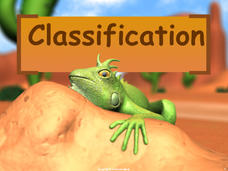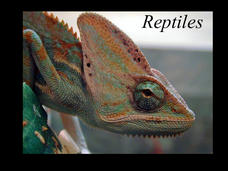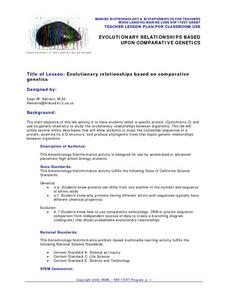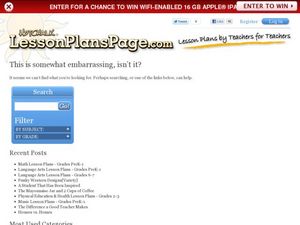Biology Junction
Invertebrates
How many different invertebrates can you name? A thorough presentation describes the eight different Phyla of invertebrates. Each slide gives a quick overview of the important physical characteristics of each of the Phyla.
Biology Junction
Arthropods
Even the creepy crawlers have pretty amazing anatomy! A thorough lesson describes characteristics of arthropods with an emphasis on their structures. Beginning with a review of the taxonomy hierarchy, the lesson explains the different...
Biology Junction
DNA and Replication
Enzymes proofread DNA, reducing the error rate to one in one billion base pairs. Learn about the important process and so much more with the help of a presentation. It opens with the history of DNA and the major scientific contributions...
Biology Junction
Classification of Life
Did you know scientists identify more than 13 billion species of organisms, and they discover more almost every day? An interesting presentation demonstrates how scientists keep track of so many species. It also shows how they...
Curated OER
Keep Away
Study biological diversity by analyzing given data, and make inferences about the possible effects of oil drilling operations on specific benthic communities. This lesson allows students to use their statistical analysis skills asweel as...
Curated OER
Animal Nutrition, Variations, Adaptations & Regulation
Information about digestion of various food components is given in this PowerPoint. The diets of herbivores and carnivores are compared, and there are many diagrams giving details of their digestive system specializations. The labelled...
Curated OER
Introduction to Adaptation
Tenth graders observe collections of specimens and discuss their answers to provided questions. They explore common ancestry, homology, analogy, adaptive radiation, and evolution, while formulating creative answers based on their...
Agriculture in the Classroom
A Rafter of Turkeys
How did that turkey get from the early Aztec culture to your table? Learn about the history of wild and domesticated turkeys in North America, as well as their inclusion in Thanksgiving traditions, with a two-part agricultural science...
Curated OER
Echinoderms
In this echinoderm worksheet, students will explore the characteristics of echinoderms including their body structures and larval stages. Then students will match the five classes of echinoderms to their descriptions. This worksheet has...
Curated OER
Quick Concept Demonstrations
Students research the nervous system. Demonstrations on how to pick up keyed information in text is shown daily and weekly. Reviewed for content is Nerve Impulse, Polarization and Depolarization and perception. A spreadsheet will graph...
Biology Junction
Cell Cycle and Mitosis
Deepen understanding of cell division with this resource. Young scientists read short paragraphs about the different stages of the cell cycle and use this information to answer a series of basic short answer questions and label several...
Biology Junction
Reptiles
When crocodiles close their mouths, you still see their teeth, but when alligators close their mouths, their teeth are hidden. Learn more about these reptiles and their many evolutionary cousins in a fact-filled presentation. It...
Curated OER
Who is the Sea Otter Related to?
Students examine the genetic relationships of different organisms. In groups, they discover the importance of genes and how different amino acids show various evolutionary relationships. They use an online database to continue their...
Curated OER
Evolutionary Relationships Based Upon Comparative Genetics
Students investigate the protein cytochrome c in an attempt to use its genetic chemistry to study possible evolutionary relationships between organisms. The lesson integrates technology with the use computers to perform DNA analysis.
Curated OER
Probability: The Study of Chance
Young scholars conduct an experiment, determine if a game is fair, and collect data. They interpret data, then display line graph. They conduct analysis of game for probability.
Curated OER
Design a Reef!
Here is an ambitious, but highly valuable undertaking: set up a miniature coral reef in your classroom. Young marine scientists research coral reef ecosystems and ensure all vital factors are included in their functioning model. The...
Curated OER
Fun with Phylogenetic Trees
Tenth graders differentiate angiosperms and gymnosperms. In this biology lesson, 10th graders construct a musical phylogenetic tree from information they gathered on resource websites. They present their project in class.
Curated OER
Primate Characteristics and Exaptation
Students compare the features of gorilla to humans. In this biology lesson, students simulate adaptation using materials found in the classroom. They explain what exaptation means.
Curated OER
Nudibranchs-Splendid Sea Slugs
Young scholars brainstorm a list of colorful animals and research why they are colorful. For this biology lesson, students sketch what a nudibranchs look like before watching a video. They compare their sketch to the actual nudibranchs...
Curated OER
Lung Disease
Students simulate breathing for a smoker and someone with a chronic lung disease. In this health science lesson, students examine the short and long term effects of smoking. They write a persuasive argument against it.
K12 Reader
Rainforest Ecosystems
Rainforests are the topic of this brief reading passage. Learners can find out all about the different layers of the rainforest as well as the types of creatures that live there. After reading, they respond to five questions about the text.
Curated OER
Organisms and Their Environment
In this organisms and their environment worksheet, students will review concepts relating to ecological studies, levels of organization in ecology, and relationships between organisms in ecosystems. This worksheet has 10 fill in the...
Curated OER
Organizing Life
In this classification worksheet, students will review vocabulary words associated with the organization of living things which includes kingdom, phylum, class, order, family, genus, and species. This worksheet has 5 fill in the blank...
Curated OER
Life Substance
For this life substances worksheet, students will review carbon atoms, monosaccharides, dissaccharides, polysaccharides, lipids, proteins, and nucleic acids. This worksheet has 4 true or false and 17 matching questions.

























